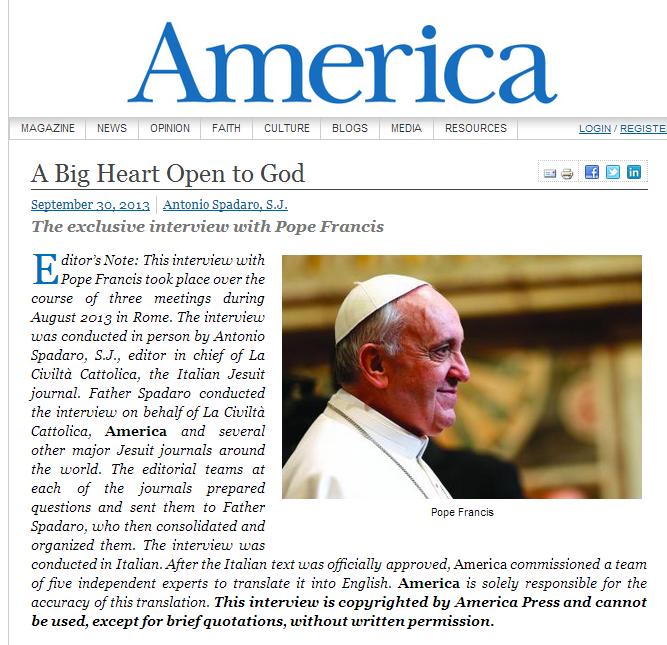
See the text at: http://www.americamagazine.org/pope-interview What are your reactions?
1. Pope Francis is a Liberationist
His liberationist colors are most apparent in the interview in his conceptualization of the church as "the people of God," a phrase he utters eight times during the interview. "The image of the church I like is that of the holy, faithful people of God. This is the definition I often use, and then there is that image from the Second Vatican Council's 'Dogmatic Constitution on the Church." Developed at the Second Vatican Council (1962-65) and championed by Latin American and other Catholic liberationists, the idea is that the Church is first and foremost a community of Christian brethren. The church as ecclesial institution governed by a clerical hierarchy is not jettisoned but becomes secondary. Such definition of the church necessarily leads to a focus on the Global South, where some 70 percent of the Catholic "people of God" live.
R. Andrew Chesnut <rachesnut@vcu.edu>
Virginia Commonwealth University, Richmond, VA 23284
Excerpted from: http://www.huffingtonpost.com/r-andrew-chesnut/pope-francis-the-charisma_b_3975144.html?utm_hp_ref=tw
Pope Francis has outdone his predecessors in using the ecclesiology of Vatican II and the language of liberation theology, but he refuses to budge on matters of sexual morality and women's equality. On the surface, the new pope seems to be saying that the church's governance can be more pastoral and sensitive to the genuine complexity's of life today, but Catholic doctrine can never change. This may be an astute contrivance to avoid assassination. (Many of us remember the conspiracy theories behind the sudden death of Pope John Paul I.) Were Francis to hint that it is permissible to question the official stand on birth control, abortion, women's ordination, and so on, conservative Catholics would denounce him as surely as they did John Paul II when he pointed out the shortcomings of capitalism. By remaining doctrinally conservative, Francis is able to avoid accusations of unorthodoxy that could persuade dogmatists that this heretic in the white cassock needs to be eliminated. Joseph Martos <jmartos@bellarmine.edu> By pointing to a common, everyday sanctity I think that Francis is trying to move Catholicism away from its tendency to “lock itself up in small things, in small-minded rules” and its “obsession with the transmission of a disjointed multitude of doctrines” toward a more practical message of what it means to live as an everyday Christian in the twenty-first century. Francis’ focus on seeking and finding God in all things, the Jesuit imperative, helps remind us not only that, “God is real. He manifests himself today [and that] God is everywhere,” but that we simply need to learn how to better discern God’s presence. But, as Francis says, finding God in all things is not an “empirical eureka.” Rather, Francis reminds us that, understood in the biblical sense, God is always a surprise and one never knows where and how God can be found. With this Ignatian disposition discernment becomes crucial for Christians because the forms where God is expressed can be multiform. I think that Francis emphasis on discernment aims to remind the faithful that the ability to find God in all things always affords us the opportunity to be a contemplative in action, Ad majorem Dei gloriam. Robert Pennington <RPennington@stu.edu>2. A conservative-liberal who will avoid assassination
Louisville, KY 40208
3. Discerning God’s presence in everyday life
St. Thomas University, Miami, FL 33054
4. A call to action in the Kingdom
I do not expect to ever have a say in the governance of the Church and imagine that issues like married clergy or women in the priesthood are not on the near agenda for the Pope. I do not want change of dogmas, although I would welcome changes in the manner in which dogmas are used to shut down conversation or to "define" who we are called to be as church or to single out who are the good Catholics and who are not.
However, there is room for development and even reversal in the church's teachings on matters of practice and on moral issues and I think that the Pope has indicated this. Indeed, the moral demands of discipleship will never be credible if reduced to three or four controversial "flash points."
What I take from the interview, however, is a call to action. As a sinner I am called to recognize that religion is not about me and while the question of rights within the Church is not trivial, participation in the Kingdom of God happens outside the boundaries of the Institution as often, if not more, than within.
The Kingdom appears often where and how we least expect it. Catholics need to find ways of forming bonds among themselves that are foundational for community and for strengthening them in how they encounter life. The Pope speaks of discernment, the signs of the times, and the substance of holiness as concrete, not theoretical and certainly not to found in norms that we cannot fulfill, but wish to impose of others.
If I am to embrace the secularity of the Gospel, that is if I am to enter the kingdom of God as it is unfolding now (as it was in Jesus' life) then no dogma or practice should take me away from the reality of the other or use up my energy that could be spent in caring.
The Pope made it clear that faith is not an isolated commitment and that the community both historically and socially is necessary for hearing, understanding, and living the Good news. Nevertheless, I hear in his words the invitation to "get on with it!” Don't waste time fighting the too long battle of ecclesiastical reform, when you could be becoming a visible presence, with others, of God's saving love in the world.
Richard Shields <richshields@sympatico.ca>
University of St. Michael's College
Toronto Ontario Canada M5S 1J4